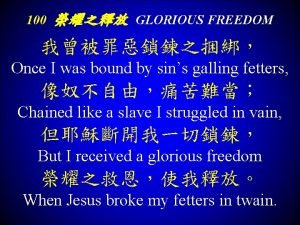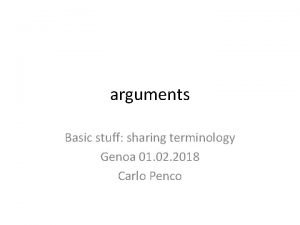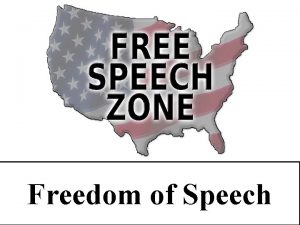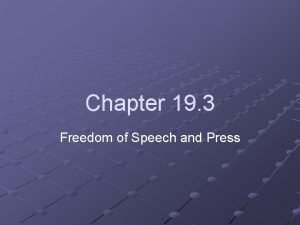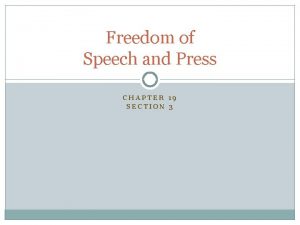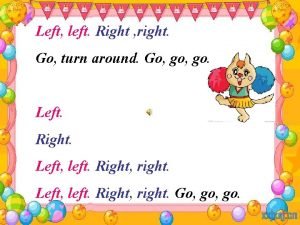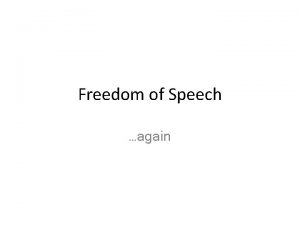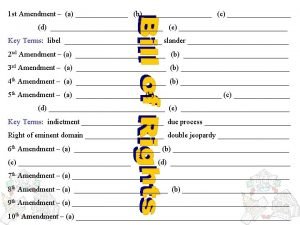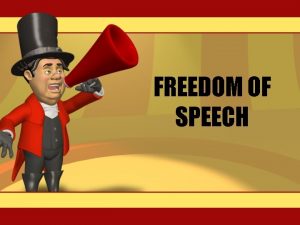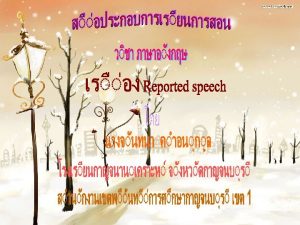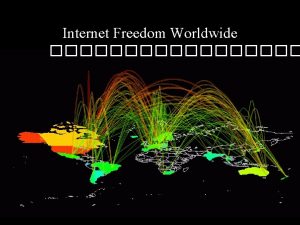Freedom of speech The right to freedom of










- Slides: 10

Freedom of speech 言論自由

The right to freedom of speech and expression Concepts of freedom of speech can be found in early human rights documents. England’s Bill of Rights 1689 granted 'freedom of speech in Parliament' and the Declaration of the Rights of Man and of the Citizen, adopted during the French Revolution in 1789, specifically affirmed freedom of speech as an inalienable right. [4] The Declaration provides for freedom of expression in Article 11, which states that: "The free communication of ideas and opinions is one of the most precious of the rights of man. Every citizen may, accordingly, speak, write, and print with freedom, but shall be responsible for such abuses of this freedom as shall be defined by law. " Article 19 of the Universal Declaration of Human Rights, adopted in 1948, states that: "Everyone has the right to freedom of opinion and expression; this right includes freedom to hold opinions without interference and to seek, receive and impart information and ideas through any media and regardless of frontiers. "

Today freedom of speech, or the freedom of expression, is recognized in international and regional human rights law. The right is enshrined in Article 19 of the International Covenant on Civil and Political Rights, Article 10 of the European Convention on Human Rights, Article 13 of the American Convention on Human Rights and Article 9 of the African Charter on Human and Peoples' Rights. Based on John Milton's arguments, freedom of speech is understood as a multi-faceted right that includes not only the right to express, or disseminate, information and ideas, but three further distinct aspects: • the right to seek information and ideas; • the right to receive information and ideas; • the right to impart information and ideas. International, regional and national standards also recognize that freedom of speech, as the freedom of expression, includes any medium, be it orally, in written, in print, through the Internet or through art forms. This means that the protection of freedom of speech as a right includes not only the content, but also the means of expression.

Relationship to other rights The right to freedom of speech and expression is closely related to other rights, and may be limited when conflicting with other rights (see Limitations on freedom of speech). The right to freedom of expression is also related to the right to a fair trial and court proceeding which may limit access to the search for information or determine the opportunity and means in which freedom of expression is manifested within court proceedings. As a general principle freedom of expression may not limit the right to privacy, as well as the honor and reputation of others. However greater latitude is given when criticism of public figures is involved

• The right to freedom of expression is particularly important for media, which plays a special role as the bearer of the general right to freedom of expression for all. However, freedom of the press is not necessarily enabling freedom of speech. Judith Lichtenberg has outlined conditions in which freedom of the press may constrain freedom of speech, for example where the media suppresses information or stifles the diversity of voices inherent in freedom of speech. Lichtenberg argues that freedom of the press is simply a form of property right summed up by the principle "no money, no voice".

Origins Freedom of speech and expression has a long history that predates modern international human rights instruments. It is thought that ancient Athens’ democratic ideology of free speech may have emerged in the late 6 th or early 5 th century BC. Two of the most cherished values of the Roman Republic were freedom of religion and freedom of speech. In Islamic ethics, freedom of speech was first declared in the Rashidun period by the caliph Umar in the 7 th century AD. [13][verification needed] In the Abbasid Caliphate period, freedom of speech was also declared by al-Hashimi (a cousin of Caliph al-Ma'mun) in a letter to one of the religious opponents he was attempting to convert through reason.

Democracy • The notion of freedom of expression is intimately linked to political debate and the concept of democracy. The norms on limiting freedom of expression mean that public debate may not be completely suppressed even in times of emergency. One of the most notable proponents of the link between freedom of speech and democracy is Alexander Meiklejohn. He argues that the concept of democracy is that of self-government by the people. For such a system to work an informed electorate is necessary. In order to be appropriately knowledgeable, there must be no constraints on the free flow of information and ideas.

• According to Meiklejohn, democracy will not be true to its essential ideal if those in power are able to manipulate the electorate by withholding information and stifling criticism. Meiklejohn acknowledges that the desire to manipulate opinion can stem from the motive of seeking to benefit society. However, he argues, choosing manipulation negates, in its means, the democratic ideal.

• Eric Barendt has called this defence of free speech on the grounds of democracy "probably the most attractive and certainly the most fashionable free speech theory in modern Western democracies". Thomas I. Emerson expanded on this defence when he argued that freedom of speech helps to provide a balance between stability and change. Freedom of speech acts as a "safety valve" to let off steam when people might otherwise be bent on revolution. He argues that "The principle of open discussion is a method of achieving a moral adaptable and at the same time more stable community, of maintaining the precarious balance between healthy cleavage and necessary consensus. " Emerson furthermore maintains that "Opposition serves a vital social function in offsetting or ameliorating (the) normal process of bureaucratic decay. "

• Research undertaken by the Worldwide Governance Indicators project at the World Bank, indicates that freedom of speech, and the process of accountability that follows it, have a significant impact in the quality of governance of a country. "Voice and Accountability" within a country, defined as "the extent to which a country's citizens are able to participate in selecting their government, as well as freedom of expression, freedom of association, and free media" is one of the six dimensions of governance that the Worldwide Governance Indicators measure for more than 200 countries.
 Family time
Family time Right product right place right time right price
Right product right place right time right price The right man on the right place at the right time
The right man on the right place at the right time Glorious freedom wonderful freedom
Glorious freedom wonderful freedom Positive freedom negative freedom
Positive freedom negative freedom Speech success criteria
Speech success criteria Chapter 19 section 3 freedom of speech and press
Chapter 19 section 3 freedom of speech and press Chapter 19 section 3 freedom of speech and press
Chapter 19 section 3 freedom of speech and press Freedom and responsibility speech
Freedom and responsibility speech Left right go turn around go go go
Left right go turn around go go go You put your right foot in
You put your right foot in



